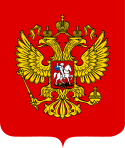- Rodina
-
For other uses, see Rodina (disambiguation).
Rodina 
Leader Aleksander Babakov Founded August 2003, Party of Russian Regions (1998) Dissolved 28 October 2006 Merged into A Just Russia Headquarters Moscow Ideology Socialism,
Left-wing nationalism, ConservatismInternational affiliation None Website www.Rodina-NPS.ru Russia 
This article is part of the series:
Politics and government of
Russia- Russian Constitution of 1906
- Russian Constitution of 1918
- 1924 Soviet Constitution
- 1936 Soviet Constitution
- 1977 Soviet Constitution
- Russian Constitution of 1978
- Constitution of Russia 1993
Legislature- Prime Minister
- First Deputy Prime Minister
- Constitutional Court
- Supreme Court
- Supreme Court of Arbitration
- Legal system
- President
- Parliament
- Referendums
- Central Election Commission
- Political parties
Rodina or Motherland-National Patriotic Union (Rodina - Narodno-Patrioticheskiy Soyuz, Партия "РОДИНА") was one of the four parties that controlled seats in the Russian legislature in 2003-2007. It was a coalition of 30 nationalist and left-wing groups that was established by Dmitry Rogozin, Sergey Glazyev, Sergey Baburin, Viktor Gerashchenko, Georgy Shpak, Valentin Varennikov and others in August 2003. The party's ideology combined socialist and nationalist ideas. Its headquarters were located in Moscow. In the 2003 Duma elections, Rodina won 9.2 percent of the vote and ended up with 37 of the 450 seats in the Duma.
Following allegations brought by the Communist Party and ousted reform-oriented liberal parties such as the Union of Right Forces and Yabloko that President Vladimir Putin's United Russia coalition had manipulated elections to ensure a favorable outcome, Rodina declined to field its own candidate in the 14 March 2004 presidential elections. This created a schism within Rodina: Glazyev insisted on running for President under the banner of an officially separate Rodina party, but Rogozin was able to consolidate his support and defeat Glazyev.
In the aftermath of the 2003 elections, the party mostly supported the policies of President Putin. However, in February 2005 four Rodina deputies, including Dmitry Rogozin, went on a public hunger strike and locked themselves in their offices at the State Duma to protest the welfare reforms being pushed through by Putin's Government. The bloc since increasingly adopted the slogan "Za Putina, Protiv Pravitel'stva" (For Putin, Against the Government), and stated that its immediate goal was to win a parliamentary majority in the 2007 State Duma elections.
On 27 January 2005, nineteen members of the State Duma, including members of Rodina and the Communist Party, signed a petition to the prosecutor-general demanding that Jewish organisations be banned in the Russian Federation. This caused a political scandal, with then-president Putin (who was participating in commemorations for the anniversary of the liberation of Auschwitz on the day that the petition was issued) expressing shame over the petition's content and the Union of Councils for Soviet Jews issuing a statement roundly criticising the petition and its signers, but the prosecutor-general, in a later investigation, declined to charge the signatories of the petition with fomenting racial hatred.
In July 2005 the party's co-leader Sergey Baburin left the bloc, taking nine Duma deputies with him and forming an alternative group in the State Duma, which also calls itself 'Motherland'. The split led to a reunification of Dmitry Rogozin's and Sergey Glazyev's supporters.
Dmitry Rogozin had in recent months accused the Kremlin of waging a dirty war against his bloc, which he claims is feared by the United Russia party because of its potential electoral support. Rogozin had also announced intentions to take legal action against the State Duma for allowing Baburin to register his bloc in the Duma as 'Motherland', creating a potential for confusion within the electorate.
On 6 November 2005, Rodina was barred from taking part in the December elections to the Moscow Duma following a complaint filed by the Liberal Democratic Party of Russia that Rodina's advertising campaign incited racial hatred. The advertisement in question showed dark-skinned Caucasian immigrants tossing watermelon rinds to the ground and ended with the slogan, "let's clear our city of trash". It garnered much controversy and opinion polls predicted that Rodina would come second with close to 25% in the December vote. Rogozin appealed the decision, but the ban was upheld on 1 December 2005.[1]
Rodina's difficulties continued into 2006, when it failed to obtain permission to contest local elections in a number of regions. It did, however, come third in the regional elections in Altay Republic.
Dmitry Rogozin unexpectedly stepped down as party leader in March 2006, and was replaced by the less known businessman Aleksander Babakov. Many suspected this was a tactical decision on Rodina's part to ease pressure from the Kremlin, although a small number of party members in Moscow had been vocal in their criticism of Rogozin's more outlandish nationalist rhetoric.
Rodina merged with the Russian Party of Life and the Russian Pensioners' Party into a new party, A Just Russia, on 28 October 2006. Many of Rodina's Parliamentary faction joined the new party except for Dmitry Rogozin, Andrei Saveliyev and Sergei Glazyev, who at present does not belong to any party.
In 2007 Dmitry Rogozin was appointed Russian Ambassador to NATO.
Contents
Party name
"Rodina" (Russian родина) means motherland. When capitalized, the term refers to the whole country, particularly in political speech.
See also
References
- ^ The Upheaval in France – an Inspiration for Russian Xenophobes? Dmitry Babich, 15-11-2005 12:03
External links
Categories:- Defunct political parties in Russia
- Political parties established in 1998
- Political parties disestablished in 2006
- A Just Russia
- 1998 establishments in Russia
Wikimedia Foundation. 2010.
